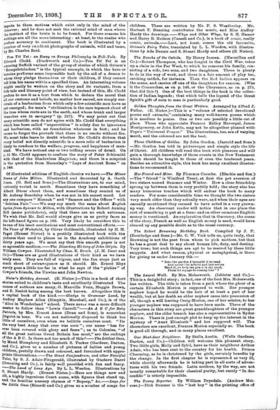Bumpelstilzchen " is the typical example, in which the hero
or heroine performs some impossible task by the aid of a demon to whom they pledge themselves or their children, if they cannot tell him his name within a specified time. An interesting volume might easily be written on the story and its variants, from a folk-tale and literary point of view, but instead of this, Mr. Clodd prefers to use it as a text from which to deduce the moral that all our customs and beliefs, no matter how sacred, are simply sur- vivals of a barbarism from which only a few scientific men have as yet emerged; for man's "civilisation is the rare topmost shoot of the tree whose roots are in the earth, and whose trunk and larger branches are in savagery " (p. 227). We may point out that many scientific men do not agree with Mr. Clodd that everything which has been called "superstition" is solely due to ignorance and barbarism, with no foundation whatever in fact ; and he seems to forget the proverb that there is no smoke without fire. We must take leave to doubt whether Mr. Clodd's dictum that every belief not directly scientific is a mere relic of barbarism is likely to conduce to the welfare, progress, and happiness of man- kind. We have noticed one or two trifling errors of detail. On p. 51 Mr. Clodd appears to confuse the story of Peter Sehlemihl with that of the Shadowless Magician; and there is a misprint in the quotation from Macaulay's "Lays of Ancient Rome" on p. 149.










































 Previous page
Previous page